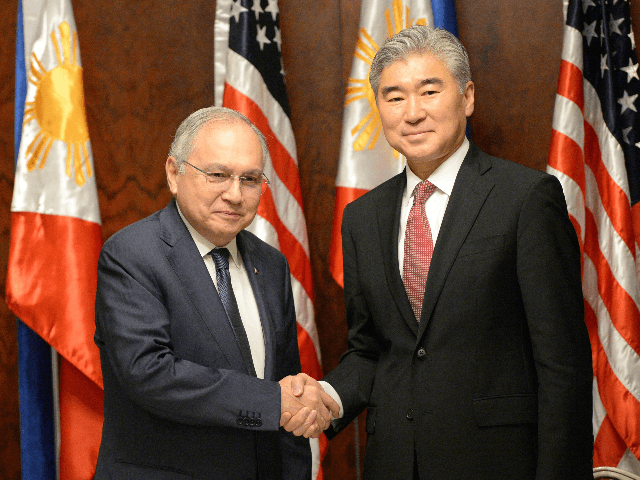Jose Manuel Romualdez, the Philippine ambassador to the United States, said on Tuesday the two countries are in discussions to strengthen their 1951 Mutual Defense Treaty.
The unstated assumption is that a closer military relationship between America and the Philippines will help restrain Chinese aggression in the South China Sea.
“There is a mechanism, the mutual defense board, where the two sides talk about, not necessarily issues, but things to strengthen our relationship about our defense treaty,” Romualdez explained at a press conference after a bilateral strategic dialogue between the United States and the Philippines held in Manila. The board he referred to is scheduled to meet in September.
A joint statement from the U.S. and the Philippines after the bilateral dialogue cited U.S. Secretary of State Mike Pompeo’s statement in March that “any armed attack on Philippine armed forces, public vessels, or aircraft in the SCS [South China Sea] will trigger Article IV of the Mutual Defense Treaty.”
“Both sides also emphasized the importance of concluding an effective and substantive Code of Conduct that would not prejudice the rights under international law of both claimant states and non-claimant states in the SCS,” the joint statement said, implicitly rebuking China for disregarding international arbitration rulings that contradict its claim of ownership over most of the region.
Assistant Secretary of State for East Asian and Pacific Affairs David Stilwell said after the bilateral dialogue that Manila is “well-positioned” to ensure the Code of Conduct for maritime activity in the South China Sea is followed to protect “freedom of navigation and overflight and other lawful uses of the sea for all countries, as well as rights of claimant states to pursue security development arrangements with partners of their choosing.”
Philippine Defense Secretary Delfin Lorenzana said in December that the Mutual Defense Treaty should be updated to make it clear the United States will back up lawful Philippine claims in the South China Sea and will defend the Philippines against China if necessary.
Lorenzana was implicitly critical of the U.S. for not putting its full weight behind Manila’s claims against China. In fairness, the Philippine administration has not always put its own full weight behind those claims. President Rodrigo Duterte has taken every position from wearily accepting China is too rich and powerful to fight, to threatening the Chinese with suicide bombers if they go too far.
The mercurial Duterte is currently wooing Chinese business interests with such ardor that the Trump administration took the bilateral dialogue as an opportunity to remind Philippine officials about their longstanding shared strategic interests with the United States.
The National noticed a crowd of Filipinos camped around the Chinese embassy in Manila to send that same message. The demonstrators are angry about China’s June sinking of a Philippine fishing boat in the disputed Spratly Islands and the muted response from the normally outspoken Duterte.
Anxious Filipinos are also closely watching a standoff between Vietnamese and Chinese coast guard ships in the same region after a Chinese geological survey vessel sailed into Vietnamese waters. Some of Duterte’s domestic critics think he should approach Chinese territorial transgressions in the more pugnacious manner employed by the comparably outgunned Vietnamese.
The National speculated Duterte goes wobbly in confrontations with China because he does not believe the United States will fully support the Philippines if a conflict breaks out. If that is the case, today’s bilateral dialogue and the “strengthening” of the Mutual Defense Treaty desired by Manila might help stiffen Duterte’s resolve and reassure other Pacific leaders.
“For the moment, it is the Philippines and Vietnam who are caught in the crosshairs. But every country across the South China Sea will face a version of Duterte’s dilemma: back down repeatedly in the face of small confrontations and have their own people turn on them, or stand up to China and risk facing the regional superpower alone,” The National predicted.

COMMENTS
Please let us know if you're having issues with commenting.